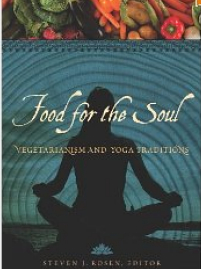Book Review: Food for the Soul – Vegetarianism and Yoga Traditions by Steven Rosen
By Charles S. J. White | Авг 05, 2011

Food for the Soul: Vegetarianism and Yoga Traditions , edited by Steven J. Rosen (Satyaraja Das), Praeger Publishing, 2011, 166 pages.
This is a book that needed to be written. Period. Today, Yoga is often thought of as a catch-phrase for exercises of a particular kind, and few know — or care — about its hoary roots in Hindu tradition. Those who do know are divided about whether or not one needs to be a vegetarian. But as Rosen and other well-chosen contributors prove in this edited volume — there really should be no question about a Yogi’s diet. Yoga means higher consciousness, and higher consciousness means love and compassion. Indeed, Patanjali and other early authorities on the Yoga tradition assert that ahimsa, nonaggression, is as integral to Yoga as meditation is, and Rosen’s contributors cite all the right sources, making this clear and obvious — and also that this nonaggression extends to the point of vegetarianism.
And speaking of the contributors, Rosen, for this book, brilliantly gathered together representatives of all the modern Yoga schools, from Maharishi Mahesh Yogi to Swami Satchidananda, from Jivamukti to Jain Yoga traditions. The net result is that the reader becomes privy to all the voices necessary to understand Yoga and its authentic connection to a harmless diet. Each major Yoga school is represented, both by practitioners and by scholars, so that readers become aware of all the arguments involved, and, in the end, see the reality of the subject at hand: that one needs to adhere to a nonmeat diet if one hopes to practice Yoga in the proper way.
Rosen’s introductory article particularly intrigued me. He shows that, though there are clearly exceptions, most Yoga lineages today can be traced to two accomplished Yogis in the tradition: Sri Krishnamacharya and Swami Sivananda. Krishnamacharya is the fount of teachers such as K. Pattabhi Jois, T. K. V. Desikachar, and B. K. S. Iyengar, whose techniques consist of Ashtanga-Vinyasa, Viniyoga, and the Iyengar Method, respectively. Sivananda’s tradition, on the other hand, gave rise to the Integral Yoga Institute, Swami Satchidananda, Swami Chinmayananda, and others. Rosen’s point is as follows: most Yoga practitioners today use the methods formulated by these two men, either as they were originally espoused or in conjunction with other methods. And both these men promoted vegetarianism! Clearly, then, all groups and lineages that sprouted from these sources should promote the same teachings they did, including vegetarianism.
Then after making his point, Rosen engages many voices of authorities on Yoga to speak for themselves, as already stated, so that by the end of the book, there is no question of an alternative point of view, at least not if one is practicing authentic Yoga.
As an addendum, albeit an important one, Rosen offers two final essays, one by Joshua Greene and another authored by Rosen himself, on the subject of Bhakti-yoga, which, according to the Bhagavad Gita (6.47), is the culminating Yoga system in the practice of Yoga. Here, again, we see that vegetarianism is unequivocally mandated. In this way, it becomes clear that there is simply no arguing the point — from the most basic forms of Yoga to the most advanced, vegetarianism is unavoidable if one wants to reach perfection in practice.
For those who are meat-eating Yogis, wanting an easy way out, this book is to be avoided at all costs. If, however, you are either a vegetarian or someone who is sitting on the fence — a sincere meat eater who is ready to give up eating meat for his or her practice of Yoga — this book will offer much direction, knowledge, and food for thought.
Charles S. J. White is Professor Emeritus of Philosophy and Religion, American University, Washington, D.C.
The book is available at amazon.com http://www.amazon.com/Food-Soul-Vegetarianism-Yoga-Traditions/dp/0313397031















